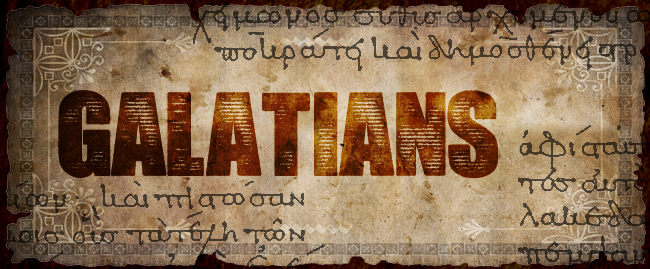Tonight we are concluding our study of Paul’s letter to the Galatians with Galatians 6. If you have about 20 minutes today, please re-read the entirety of the letter to see how Paul wraps up his exhortation to the congregation. Paul didn’t physically write his letters, rather he used a scribe. (In Romans, the scribe identifies himself as Tertius. Rom. 16:22.) However, the very last part of this letter, beginning with v.11, is written by Paul himself. (Paul also wrote the benediction to 1 Corinthians. 1 Cor. 16:21.) This conclusion is the bullet points that Paul emphasized to his audience throughout this letter– 1) the Judaizing agitators only want you to follow the law so that they may escape persecution from non-Christian Jews, 2) they receive circumcision but don’t actually follow the law, although they want you to do so, 3) all of creation was circumcised on the Cross, therefore ritual circumcision is nothing, 4) the only law is that of peace and mercy, and 5) the only physical marks that matter, are the marks you receive from persecution as Paul did. In other words, ritual circumcision is of no value, and those that are pushing this agenda have ulterior motives.
Finally, compare Paul’s benediction in v.18 with those of his other letters. As with his greeting in 1:1-5, the benediction is terse and generally much shorter than the benedictions he has used in his other letters. If you have time today, please look at these other benedictions.
Next Week will begin our study of James. The Sunday lectionary will also have us reading through James during the month of September so if something in the Epistle reading catches your attention, please bring it up on Tuesdays. James is one of the “catholic” epistles (like John and Jude) because, unlike Paul’s letters, James is not writing to a particular congregation with particular issues but to the universal church at large. And, unlike all of the other epistles, James is not theological but solely ethical. James’s concern is with horizontal interpersonal relationships – how members of a Christian community relate to one another – and not with the vertical relationship between his audience and God specifically. James is a work of moral exhortation teaching us what “faith working through love” (Gal. 5:6) looks like in practice. James is written in the nature of Hebrew wisdom literature such as found in Proverbs or Sirach. Although James does specifically state he is quoting Jesus, much of James’ teaching will come directly from Jesus’ teachings and particularly those preserved in Matthew’s Sermon on the Mount (Matt 5-7) or Luke’s Sermon on the Plain (Luke 6:17-49).
I have attached Luke Timothy Johnson’s brief overview of James from his book The Writings of the New Testament. I have also attached a more in-depth overview from Ben Witherington’s Letters and Homilies for Jewish Christians. As with all of our bible studies, you do not need to read the attachments and you only need to bring your Bible with you on Tuesday nights.
Dinner is at 6. The menu is chili. Discussion about 6:45. Hope to see you here.
The grace of our Lord Jesus Christ be with your spirit, brethren. Amen.
Galatians 6:18

